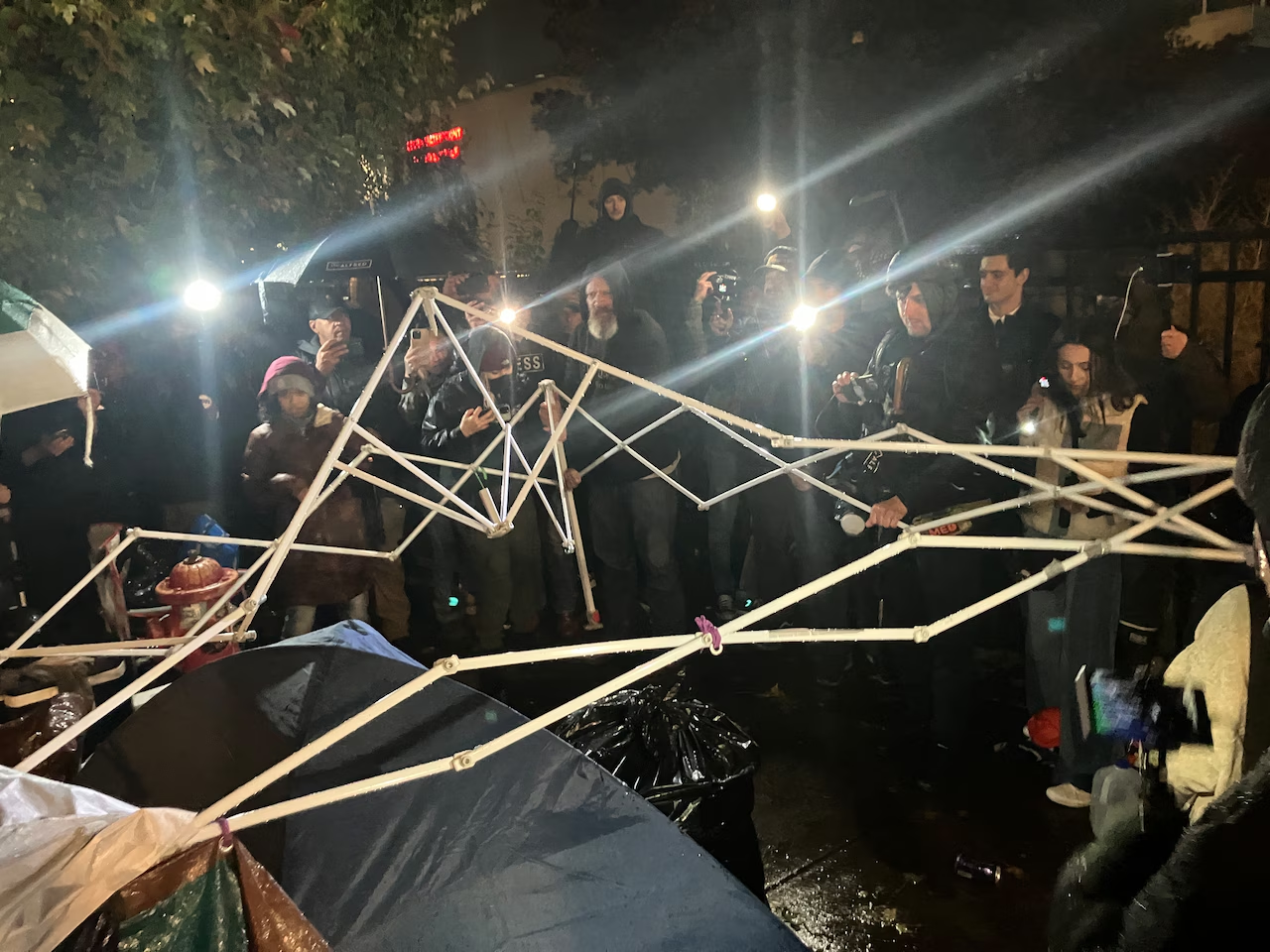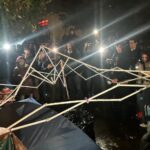Escalation at the ICE Facility
Portland authorities intensified their response to protests outside the federal Immigration and Customs Enforcement (ICE) facility over the weekend, abruptly clearing a protest camp that had occupied the area for months. The decision came after repeated confrontations and rising violence between protesters and counter-protesters, which officials said created unsafe conditions for the community.
Mayor Keith Wilson confirmed Monday that the city’s police force was instructed to ensure the camp’s immediate removal, a shift from Portland’s usual method of posting 72-hour advance notices before clearing such encampments.
“It all comes down to safety—ensuring the community safety of all participants,” Wilson said. “We saw it grow to a point where arrests were being made, there was criminal activity, and fights were breaking out. We needed to act to limit that.”
Also Read
A Protest Site Turned Flashpoint
The small sidewalk camp outside Portland’s ICE compound in South Portland had long served as a hub for anti-ICE activists. For roughly 20 weeks, protesters had gathered there with a modest setup of tents, medical supplies, chairs, and food coolers.
Initially, the site was relatively peaceful. However, tensions began escalating after former President Donald Trump’s Sept. 27 announcement that he intended to deploy the National Guard to Portland. The camp soon became a target for counter-protesters, drawing large nightly crowds and, increasingly, confrontations.
One of the most visible counter-protesters, Thomas Allen, a 36-year-old right-wing streamer, was arrested earlier this month and charged with assaulting a protester. A judge later ordered him to stay at least 200 feet away from the facility. His presence, along with other conservative media figures, attracted more right-wing activists to the area, intensifying the hostility between groups.
Mounting Arrests and Police Response
According to Portland Police Bureau records, officers made five arrests in the week before the clearance and two the week prior, mainly for assault and disorderly conduct. Police also intervened in multiple fights and cited individuals for open container violations.
Over the 20-week protest period, the city’s Impact Reduction Program had already cleared the camp 12 times, following its standard “sweep” process: posting notices, giving occupants time to collect belongings, and sending contracted cleanup crews from Rapid Response to handle biohazards. Each sweep followed protocol and was generally peaceful.
However, on Saturday night, police departed from that procedure. They issued an emergency abatement order, instructing protesters to dismantle their tent and vacate immediately due to “illegal activities other than camping.” Protesters complied, salvaging what supplies they could while counter-protesters and right-wing streamers recorded the event.
The next day, cleanup crews—accompanied by rows of police officers—removed the remaining supplies, marking a rare nighttime clearance that city officials justified on public safety grounds.
What Triggered the Emergency Abatement
Police spokesperson Mike Benner said the decision to clear the camp without prior notice was made after a marked increase in “fights, antagonistic behavior, and other illegal activity.”
“Given the heightened intensity and level of criminal activity observed, the Portland Police Bureau recommended to the mayor’s office that an emergency abatement be conducted,” Benner stated. “This was done in the best interest of everyone involved to reduce the risk of harm and restore public safety.”
Benner rejected claims by right-wing media personalities that the camp was cleared due to their complaints or political pressure.
“The Bureau did not act in response to any one group,” he said. “Our decisions are based solely on public safety, law, and observable conditions—not ideology.”
A Departure from Portland’s Normal Camp Policy
With more than 7,500 unhoused residents in Multnomah County, Portland typically follows a well-defined camp removal policy. Normally, city workers issue a 72-hour notice, allowing occupants to pack up or request storage for their belongings. The process, though controversial, is meant to minimize harm and preserve people’s property.
Saturday’s emergency abatement bypassed that procedure entirely. Under city rules, such action is only allowed when officers have evidence that illegal activity other than camping is taking place—such as violence, vandalism, or drug use.
Critics of the city’s homeless sweeps often refer to the process as “being swept,” citing frequent loss of essential items like IDs or prescription medications. But in this case, even some city officials acknowledged the need for faster intervention.
“This wasn’t about the protest itself,” one city official said anonymously. “It was about what was happening around it—fights, threats, and the risk of someone getting seriously hurt.”
The Role of Counter-Protesters
Over the past few weeks, the ICE protest camp became a nightly attraction for counter-protest groups, some armed with cameras and livestream platforms. Many identified with right-wing online movements that have long criticized Portland’s political leadership and immigration policies. Their videos—often uploaded to social media—showed heated verbal clashes, shoving matches, and aggressive confrontations between opposing sides.
City officials said these encounters contributed to the mayor’s decision to escalate enforcement. What began as routine tension between protesters and federal agents evolved into a volatile standoff between political factions, each accusing the other of intimidation and harassment.
Mayor’s Statement and Future Actions
Mayor Wilson emphasized that Portland continues to support peaceful protest, but will not tolerate violence or illegal activity under the banner of activism.
“We do not want to compromise peaceful protest,” Wilson said Monday. “But when it veers into fights and criminality, we have to step in.”
He added that both his office and the Portland Police Bureau will continue to monitor the area closely and that further enforcement actions may occur if conditions worsen again.
For now, the sidewalks around the ICE facility remain clear. Yet both protesters and counter-protesters have vowed to return—each side framing the confrontation as a battle over free speech, public safety, and the right to occupy public space.
Broader Implications
The clearance underscores the tension between civil liberties and public order in Portland—a city with a long history of political activism and protests. It also raises broader questions about how cities handle demonstrations that blend with encampments, particularly when opposing factions converge.
As Portland navigates these challenges, officials say the goal is not to silence dissent but to prevent harm. Still, for many activists, Saturday’s emergency sweep marked a symbolic loss—one that reignited debate over the city’s balance between safety, protest rights, and public space.












